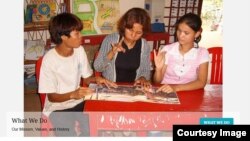Two decades ago there was no support for deaf people in Cambodia, but since the Deaf Development Program (DDP) was launched with support from the US-based Catholic organization, the situation has improved.
DDP remains the only group assisting deaf people in the country to live normal lives.
The organization also runs a number of training schemes, including coaching in hairdressing, electronics and beauty therapy.
Charlie Dittmeier, director of DDP for the past 15 years, believes that if deaf people have access to education and the jobs market they can become independent and able to support themselves and their families.
“It is very expensive to run this program as when deaf people come to us, their family generally cannot give money… so we pay for a place to live, food, medical care, and sometimes even clothes,” Dittmeier said.
For those under 16 years old, DDP refers them to Krousar Thmey, a school that provides education tailored to deaf children.
To date DDP has provided education to between 800 and 900 deaf students.
So far all funding for DDP’s work comes from overseas, through the Maryknoll Cambodia program.
As well as providing a basic education to the students, DDP offers sign language and interpreting classes, a deaf community development program.
“We are doing what the government should be doing, but the government does not have awareness, sensitivity, knowledge of the problems of deaf people, so they didn’t do much to help,” Dittmeier said.
Another major concern is the lack of schools for deaf students in the provinces or remote areas in Cambodia.
There are an estimated 51,000 deaf people in Cambodia according to DDP, but the group has only been in contact with perhaps 2,000.
Most of the 49,000 who do not have access to education, to develop a custom sign language with their families, Dittmeier said, but it means that they are limited in their opportunities.
To respond to this challenge, DDP’s community development project does outreach into the provinces to encourage more students to join its program.
Sokheun, who went through the DDP program, remembers her life before learning sign language with DDP as an isolated existence even among her family.
“Not until my parents heard about DDP was I able to receive basic sign language and now I feel more accepted and equal,” she said through an interpreter.
Srey Thom, a teacher in the same program, agreed.
“Thanks to DDP, I can communicate with other deaf people, and I am very happy.”







